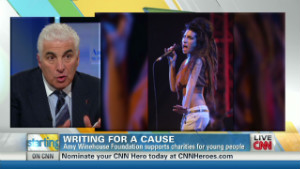
- Amy Winehouse died a year ago today at 27
- Fans and fellow stars were rooting for her to continue to find success
- The tragedy of her death was to watch a woman lose a battle so early in life
Editor's note: Breeanna Hare is a 27-year-old writer with CNN and contributes to the Marquee blog.
(CNN) -- Ours is a culture that loves to celebrate youth, but there are those 30 and older who will tell you that leaving one's 20s behind is like a revelation.
Growing out of that decade often means growing out of bad decision-making, frustrated searching and feeling generally as though life's a pinball machine -- and you're the ball.
As you age, hopefully you realize that what you've lost in youthfulness you've gained in wisdom. In the best scenarios, you know how to bounce back from bumps and are better at avoiding valleys. You appreciate your mistakes, but you'll be damned if you'll repeat them.
As much as we'd hoped she would, Amy Winehouse never got that far.
When she died at 27 last July, few truly knew the intimate details of her personal life. The public could really know only what we'd read about, seen and heard -- that she was a troubled young woman struggling with drug and alcohol abuse and that whatever was plaguing her threatened to overshadow a superb talent.
 Amy Winehouse's father opens up
Amy Winehouse's father opens up Amy Winehouse Foundation helps the young
Amy Winehouse Foundation helps the youngAhead of her standout performance via satellite at the 2008 Grammy Awards, the singer was enmeshed in negative press and a few in the media openly questioned how long she'd survive. She went on to win five awards that night, including best new artist. She owned that evening and touched hearts with her look of utter amazement and how she fled into the arms of one of her back-up singers when she bested artists such as Beyonce and Rihanna for record of the year.
The tragedy of Winehouse's passing wasn't just that the predictions came true, or that we'd lost an undeniably great talent, but also that she lost a fight so early in life. This was an artist who was blessed with the presence of someone who'd seen it all and a voice from another lifetime, a woman who could write about and then sing to life some of love's darkest sides. She sang us through our own rough spots and regrets, but couldn't seem, in the public's eye, anyway, to do the same for herself.
"I don't write songs because I want my voice to be heard or I want to be famous or any of that stuff," Winehouse told CNN in a 2007 interview. "I write songs about things I have problems with and I have to get past them and I have to make something good out of something bad."
We can't pretend to know her struggle with alcohol or substance abuse, but we've all felt some variant of the longing, loneliness, hurt and infatuation she put into her music. Winehouse presented those emotions in a visceral way with which we could connect. She could take a personal experience and strike a note of universal truth.
Take, for example, "Rehab," her Grammy-winning but controversial track from her autobiographical second album "Back to Black." It's about the time her management tried to get her sober and she refused. But it was the smirking wisecracks and stubborn defiance that had us singing along.
On her jazzy 2003 debut "Frank," it was the beautifully sung, detailed story of wounded pride on "You Sent Me Flying," and the tsk'ing, sneering disappointment in a lover on "Stronger Than Me."
"You Know I'm No Good" provided a sultry soundtrack for the flawed and self-critical while "Tears Dry on Their Own" is an anthem of resolve. The album's title track, Winehouse explained in that 2007 interview, the aftermath of a broken love.
Her massive appeal was backed by strong production on both albums, thanks to collaborations with producers Salaam Remi and Mark Ronson, and of course that voice -- rich, evocative and captivating. Those elements helped her songs' content to shine; everything's discussed with brash honesty and often a sense of humor.
"There's no point in saying anything but the truth," Winehouse told the Guardian in 2004. "Because, at the end of the day, I don't have to answer to you, or my ex, or ... I shouldn't say God ... or a man in a suit from the record company. I have to answer to myself."
That frankness and headstrong independence is what we loved about her and could relate to. Although some talked callously about her struggles, there was still an underlying hope that she'd push past her problems. So when she couldn't, her July 23 death felt to many like a sucker punch.
At the time of her death, it appeared that Winehouse was focused on recovery. An inquest last fall ruled that she'd died of alcohol poisoning and a family spokesman said at the time that "Amy was battling hard to conquer her problems with alcohol, and it is a source of great pain that she could not win in time."
Who knows what the next few years of her life could have brought. That question will always linger and is the difficulty of watching someone pass on so young -- those of us left living know just how much more life can bring. Perhaps she would have found, as Slate wrote in 2008, that "there are other, better things to romanticize than hard times and hard booze."
Instead, we're left to hope that when she died, she still felt the same way as she did when she spoke to Harper's Bazaar in 2010.
Holding on to nary an unfulfilled goal, she said, "If I died tomorrow, I would be a happy girl."
Source : CNN







{ 0 comments... Views All / Send Comment! }
Posting Komentar